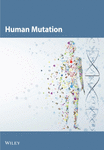Abstract
N-acetylglutamate synthase (NAGS) deficiency, an autosomal recessive disorder, is the last urea cycle disorder for which molecular testing became available. This is the first comprehensive report of 21 mutations that cause NAGS deficiency and of commonly found polymorphisms in the NAGS gene. Five mutations are reported here for the first time. A total of 10 disease-causing mutations are associated with acute neonatal hyperammonemia; the remaining mutations were found in patients with late onset disease. Residual enzymatic activities are included in this report and the deleterious effects of eight mutations were confirmed by expression studies. Mutations in the NAGS gene are distributed throughout its reading frame. No mutations have been found in exon 1, which encodes for the putative mitochondrial targeting signal and variable segment of NAGS. Three polymorphisms have been found. Early, accurate, and specific diagnosis of NAGS deficiency is critical since this condition can be successfully treated with N-carbamylglutamate (NCG, Carbaglu®; Orphan Europe). Treatment with NCG should be initiated as soon as a patient is suspected of having NAGS deficiency. Molecular testing represents the most reliable method of diagnosis. Hum Mutat 28(8), 754–759, 2007. Published 2007 Wiley-Liss, Inc.




